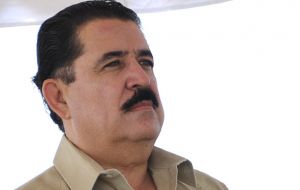MercoPress. South Atlantic News Agency
Zelaya claims US and Micheletti are involved in “laundering” the coup
 Ousted president Zelaya is running out of time and space
Ousted president Zelaya is running out of time and space Honduran ousted president Manuel Zelaya claims the United States in partnership with de facto leader Roberto Micheletti are involved in an operation to “launder” the coup d’etat of June 28th.
The operation consists in having Micheletti step down as caretaker president before the Honduran Congress and then accepts to join a transition cabinet.
“This is what is going to happen next Friday in Congress. If I accept to join the transition cabinet, he resigns and I legitimize the coup. It’s a manoeuvre I will not play into”, warned Zelaya who is holed in at the Brazilian embassy in Tegucigalpa since September 21st since his clandestine return to the country
Zelaya said that was the reason why he sent a personal letter to US president Barak Obama saying that from that date, whatever the circumstances, “I would not accept any return to the presidency, under those conditions, which would thus mean accepting what happened on June”.
“The US has been pressing me to allow Micheletti to form a transition cabinet which would then open the door for my return but I don’t trust coup mongers even when they are praying, and in this case the sole objective is to launder the situation”.
From Washington US Secretary of State spokes-person Ian Kelly confirmed that US diplomats are in permanent contact with ousted President Zelaya.
“We don’t ignore him. We talk to him, high State Department officers are in contact with him”, said Kelly.
Kelly insisted that the US has not changed its policy. We have US officials working for both sides not to agree, but simply to implement what has been agreed with the San Jose/Tegucigalpa understanding”, said Kelly.
“There’s still room to make things”, he added.
Meantime the November 29th Honduran presidential campaign is on full swing. Porfirio Lobos from the National (conservative) Party leads in opinion polls followed by Elvin Santos from the Liberal party (to which belong Zelaya and Micheletti) and Cesar Ham from Democratic Unification (left).
At the end of the month 4.5 million Honduras will be electing president, the 128 members of the single chamber Congress, 20 representatives for the Central American Parliament and mayors and councils in 298 cities, towns and villages.




Top Comments
Disclaimer & comment rulesCommenting for this story is now closed.
If you have a Facebook account, become a fan and comment on our Facebook Page!